The Next Page
Are you curious about the power of international cooperation? And how it affects our future? Tune in to the #NextPagePod, the podcast of the UN Library & Archives Geneva, designed to advance the conversation on multilateralism.
Are you curious about the power of international cooperation? And how it affects our future? Tune in to the #NextPagePod, the podcast of the UN Library & Archives Geneva, designed to advance the conversation on multilateralism.
Episodes
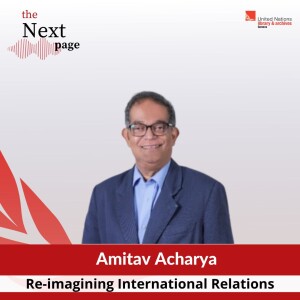
Friday Apr 28, 2023
Friday Apr 28, 2023
Re-imagining International Relations - A conversation with Amitav Acharya
Taking as a starting point that today’s multilateralism is in urgent need of an upgrade, Library & Archives Director, Francesco Pisano talks with Professor Amitav Acharya about how Global International Relations could broaden the Eurocentric way concepts and ideas in international relations developed, so that the practice of international relations could transform to be better adapted to the pluralistic world in which we live.
Amitav Acharya is the UNESCO Chair in Transnational Challenges and Governance and Distinguished Professor at the School of International Service, American University, Washington, DC. Previously he was a Professor at York University, Toronto and the University of Bristol, U.K. He is currently Honorary Professor at Rhodes University, South Africa, and Guest Professor at Nankai University, China. He was the inaugural Boeing Company Chair in International Relations at the Schwarzman Scholars Program at Tsinghua University, Fellow of Harvard’s Asia Center and John F. Kennedy School of Government, and Christensen Fellow at Oxford.
Amitav Acharya is also the recipient of an International Studies Association (ISA) Distinguished Scholar Award 2023 for his “extraordinary impact” in globalizing the study of International Relations and “mentorship of emerging scholars”.
Resources
Website: https://www.american.edu/sis/faculty/aacharya.cfm
Amitav Acharya’s Blog, The Multiplex World: https://multiplexworld.com/
Twitter: @AmitavAcharya https://twitter.com/amitavacharya
Books:
Acharya, A. & Buzan, B. (2021). Re-imagining International Relations. World Orders in the Thought and Practice of Indian, Chinese, and Islamic Civilizations. Cambridge University Press.
Acharya, A. & Buzan, B. (2019). The Making of Global International Relations. Origins and Evolution of IR at its Centenary. Cambridge University Press.
Acharya, A. (2018). Constructing Global Order. Agency and Change in World Politics. Cambridge University Press.
Acharya, A. (2018). The End of American World Order, 2nd Edition. Wiley.
Acharya, A. (2013). Rethinking Power, Institutions and Ideas in World Politics. Whose IR? Routledge.
Where to listen to this episode
Apple podcasts: https://podcasts.apple.com/us/podcast/the-next-page/id1469021154
Spotify: https://open.spotify.com/show/10fp8ROoVdve0el88KyFLy
YouTube: https://www.youtube.com/watch?v=WdteR2XP-A4&list=PLmzrhlc0gF6KlZ8KES5Jzho0d-UZdyuIx
Content
Speaker: Professor Amitav Acharya
Host: Francesco Pisano
Producer: Amy Smith
Editing & Social media designs: Amy Smith and Sotheapanha Theng
Recorded & produced at the United Nations Library & Archives Geneva
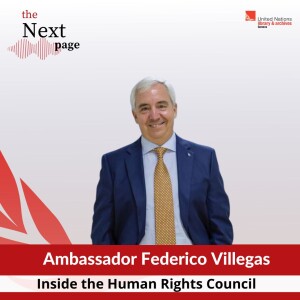
Friday Apr 14, 2023
Friday Apr 14, 2023
Inside the Human Rights Council – a conversation with Ambassador Federico Villegas, 16th President of the Human Rights Council
Human rights are a burning issue at the centre of the international arena because they are fundamental to humankind. The interpretation and respect of human rights and the response to their violations depend on discussions held annually by the Human Rights Council that convenes in Geneva. Ambassador Villegas was President of the Council in 2022, one of the most challenging years on the body's record. In this podcast episode, Ambassador Villegas explains why the Council is so important, talks about the state of human rights in the world today and shares his thoughts on the strong connection between human rights and multilateralism.
Resources
Website: https://www.ohchr.org/en/hr-bodies/hrc/sessions
Where to listen to this episode
Apple podcasts: https://podcasts.apple.com/us/podcast/the-next-page/id1469021154
Spotify: https://open.spotify.com/show/10fp8ROoVdve0el88KyFLy
YouTube:
Content
Speaker: Ambassador Federico Villegas
Host: Francesco Pisano
Producer: Amy Smith
Editing & Social media designs: Sotheapanha Theng
Recorded & produced at the United Nations Library & Archives Geneva
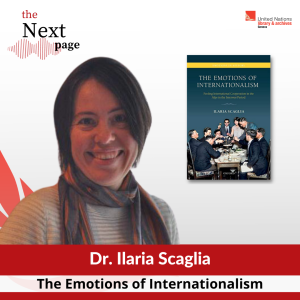
Friday Mar 24, 2023
The Emotions of Internationalism – a conversation with Ilaria Scaglia
Friday Mar 24, 2023
Friday Mar 24, 2023
The Emotions of Internationalism – a conversation with Ilaria Scaglia
Dr. Ilaria Scaglia takes us on an Alpine journey to explore the emotions that internationalists around the League of Nations sought to encourage and share. Along the way we hear mention of Heidi, the Pope, Einstein and Marie Curie, alpinists and climbers, as well as renowned doctors practicing in the Alps. Through this study of the history of emotions, we come to understand better the vision of international cooperation in the interwar period.
Resources
Scaglia, I. (2020). The Emotions of Internationalism: Feeling International Cooperation in the Alps in the Interwar Period, Oxford University Press. doi.org/10.1093/oso/9780198848325.001.0001
Novick, P. (1988). That Noble Dream: The 'Objectivity Question' and the American Historical Profession (Ideas in Context). Cambridge: Cambridge University Press. doi:10.1017/CBO9780511816345
Sluga, G., & Clavin, P. (Eds.). (2016). Internationalisms: A Twentieth-Century History. Cambridge: Cambridge University Press. doi:10.1017/9781107477568
Website: https://ilariascaglia.com/
Where to listen to this episode
Apple podcasts: https://podcasts.apple.com/us/podcast/the-next-page/id1469021154
Spotify: https://open.spotify.com/show/10fp8ROoVdve0el88KyFLy
YouTube:
Content
Speaker: Dr. Ilaria Scaglia
Host: Amy Smith
Producer: Amy Smith
Editing & Social media designs: Sotheapanha Theng
Recorded & produced at the United Nations Library & Archives Geneva
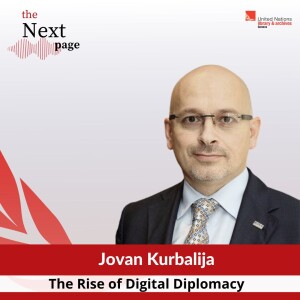
Friday Mar 10, 2023
The Rise of Digital Diplomacy - a conversation with Jovan Kurbalija
Friday Mar 10, 2023
Friday Mar 10, 2023
The Rise of Digital Diplomacy
Francesco Pisano talks with Dr. Jovan Kurbalija, Director of DiploFoundation, about the mission of Diplo. We discover more about digital diplomacy and the impact it has on multilateralism and international cooperation. Jovan Kurbalija shares highlights from the 2022 Summit on Digital Diplomacy and Governance held in Malta and discusses the trends in digital geopolitics and geoeconomics. He underlines that diplomats need new skills to keep pace with changing technology in a digital world.
Resources
Diplo website: At DIPLO technology meets diplomacy
Resources - DiploFoundation (diplomacy.edu)
Report: Stronger digital voices from Africa
Geneva Internet Platform Digital Watch website: https://dig.watch/
Where to listen to this episode
Apple podcasts: https://podcasts.apple.com/us/podcast/the-next-page/id1469021154
Spotify: https://open.spotify.com/show/10fp8ROoVdve0el88KyFLy
YouTube:
Content
Speaker: Dr. Jovan Kurbalija
Host: Francesco Pisano
Producer: Amy Smith
Editing and social media designs: Sotheapanha Theng
Recorded & produced at the United Nations Library & Archives Geneva
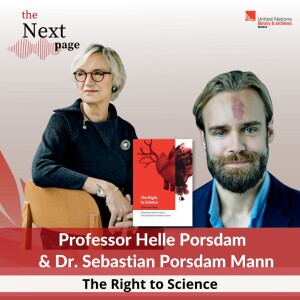
Friday Feb 24, 2023
Friday Feb 24, 2023
The Right to Science – a conversation with Helle Porsdam & Sebastian Porsdam Mann
In this episode, we host the editors of a recently published book, The Right to Science: Then and Now (2021). Professor Helle Porsdam, Professor of History and Cultural Rights at the Centre for Interdisciplinary Studies of Law (CIS) at the University of Copenhagen and who holds a UNESCO Chair in Cultural Rights, and Dr. Sebastian Porsdam Mann at the University of Oxford, speak about the fascinating history of this less well-known Human Right. They discuss what it means to participate and share in culture and science, the importance of diversity and inclusion, and what a human rights perspective brings to complex issues.
Universal Declaration of Human Rights. Article 27 - Everyone has the right freely to participate in the cultural life of the community, to enjoy the arts and to share in scientific advancement and its benefits.
Resources
Porsdam, H., & Porsdam Mann, S. (Eds.). (2021). The Right to Science: Then and Now. Cambridge: Cambridge University Press. doi:10.1017/9781108776301
Open access: https://www.cambridge.org/core/books/right-to-science/right-to-science-then/B61DA8232EC2F7B539C224ACCBF48D92
Website: https://en.unesco.org/human-rights/science
Where to listen to this episode
Apple podcasts: https://podcasts.apple.com/us/podcast/the-next-page/id1469021154
Spotify: https://open.spotify.com/show/10fp8ROoVdve0el88KyFLy
YouTube:
Content
Speakers: Professor Helle Porsdam and Dr. Sebastian Porsdam Mann
Host: Amy Smith
Editor & Producer: Amy Smith
Social media designs: Sotheapanha Theng
Recorded & produced at the United Nations Library & Archives Geneva
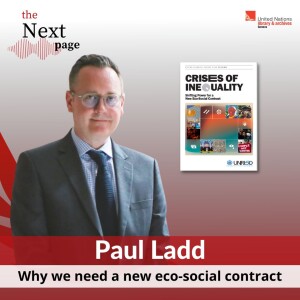
Friday Feb 10, 2023
Why we need a new eco-social contract – a conversation with Paul Ladd
Friday Feb 10, 2023
Friday Feb 10, 2023
Why we need a new eco-social contract – a conversation with Paul Ladd
In this episode we discuss with Paul Ladd, Director of the UN Research Institute on Social Development, about the contribution of the Institute to multilateralism at this 60-year milestone since UNRISD's establishment. In particular, we take a deep dive into the latest report, "Crises of Inequality", which shows why, in order to break the cycle of multiple, interlocking crises and to address inequality, we need a new eco-social contract.
Paul Ladd tells us about how UNRISD's research has, in many instances, been ahead of the curve leading to positive impact. He explains in depth key themes in the recent UNRISD flagship report and gives us clear pointers to ways in which multilateralism must evolve.
Resources
Flagship report: https://www.unrisd.org/en/library/publications/crises-of-inequality
UNRISD website: https://www.unrisd.org/en
UNRISD Twitter: https://twitter.com/unrisd
Where to listen to this episode
Apple podcasts: https://podcasts.apple.com/us/podcast/the-next-page/id1469021154
Spotify: https://open.spotify.com/show/10fp8ROoVdve0el88KyFLy
YouTube:
Content
Speakers: Paul Ladd
Host: Francesco Pisano
Production, editing and social media: Amy Smith and Panha Theng
Recorded & produced at the United Nations Library & Archives Geneva
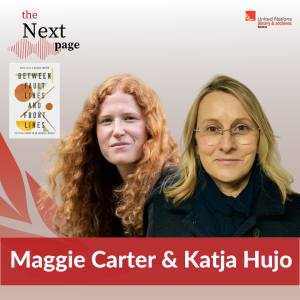
Friday Jan 27, 2023
Friday Jan 27, 2023
Shifting Power in an Unequal World – a conversation with Katja Hujo and Maggie Carter
Inequality is undoubtedly one of today’s greatest challenges. In this episode, Katja Hujo and Maggie Carter, editors of the recently published book Between Fault Lines and Front Lines: Shifting Power in an Unequal World, talk about how inequalities have reshaped structures from the local to the transnational level and the impact and consequences of inequalities. They explore the conceptual thinking around inequality and its drivers and illustrate this with examples from cases studies from around the world.
Resources
Book:
Hujo, K. & Carter, M. (Eds.) (2022) Between Fault Lines and Front Lines: Shifting Power in an Unequal World. Bloomsbury Publishing.https://www.bloomsbury.com/uk/between-fault-lines-and-front-lines-9781350229020/
Flagship report: https://www.unrisd.org/en/library/publications/crises-of-inequality
UNRISD website: https://www.unrisd.org/en
UNRISD Twitter: https://twitter.com/unrisd
Where to listen to this episode
Apple podcasts: https://podcasts.apple.com/us/podcast/the-next-page/id1469021154
Spotify: https://open.spotify.com/show/10fp8ROoVdve0el88KyFLy
YouTube:
Content
Speakers: Katja Hujo and Maggie Carter
Host: Francesco Pisano
Production, editing, social media: Amy Smith and Panha Theng
Recorded & produced at the United Nations Library & Archives Geneva
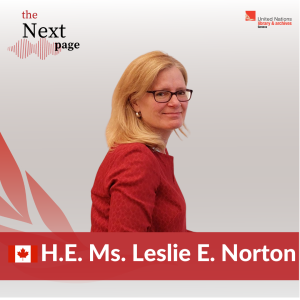
Friday Jan 13, 2023
Friday Jan 13, 2023
This first episode of 2023 continues our series with Permanent Representatives to the United Nations at Geneva.
Ambassador Leslie E. Norton tells us about her diplomatic career, speaks about Canada and its role in the world today, as well as exploring the long history of Canada’s involvement in multilateralism. Canada is a founding member of the United Nations, was part of the League of Nations, and has membership in many international and regional organizations, including the World Trade Organization, the G20 and other forums like the Organization of American States and the Asia-Pacific Economic Cooperation forum. Canada has served on the UN Security Council 8 times, the most recent being in 2000.
Resources
Where to listen to this episode
Apple podcasts: https://podcasts.apple.com/us/podcast/the-next-page/id1469021154
Spotify: https://open.spotify.com/show/10fp8ROoVdve0el88KyFLy
YouTube: https://www.youtube.com/watch?v=xqTBLYAgiWM&list=PLmzrhlc0gF6KlZ8KES5Jzho0d-UZdyuIx
Content
Speakers: Ambassador Leslie E. Norton
Host: Francesco Pisano
Editor & Producer: Amy Smith
Social media designs: Amy Smith and Yiying Zhang
Recorded & produced at the United Nations Library & Archives Geneva

Friday Dec 16, 2022
Friday Dec 16, 2022
This episode marks the 20th anniversary of Switzerland’s membership in the United Nations. Switzerland became the 190th member of the UN following a national referendum in March 2002, in which the majority of population (54.6%) voted in favour of joining the UN.
Ambassador Jürg Lauber, Permanent Representative of Switzerland to the United Nations at Geneva joined The Next Page for a conversation about Switzerland’s journey in the UN and to reflect on the two decades since its accession.
Resources
Follow the Permanent Mission of Switzerland on Twitter: SwitzerlandUN@swiss_un
The Geneva Science and Diplomacy Anticipator: https://gesda.global/
Where to listen to this episode
Apple podcasts: https://podcasts.apple.com/us/podcast/the-next-page/id1469021154
Spotify: https://open.spotify.com/show/10fp8ROoVdve0el88KyFLy
YouTube: (2) Switzerland celebrates 20 years in the UN. A conversation with Ambassador Jürg Lauber - YouTube
Content
Speakers: Ambassador Jürg Lauber, Permanent Representative of Switzerland to the United Nations Office at Geneva
Host: Francesco Pisano
Editor & Producer: Amy Smith
Social media designs: Ana Hauert, Yiying Zhang, Amber Yin
Recorded & produced at the United Nations Library & Archives Geneva
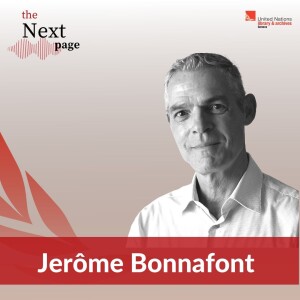
Wednesday Nov 30, 2022
Diplomate, pour quoi faire ? Une conversation avec Jérôme Bonnafont
Wednesday Nov 30, 2022
Wednesday Nov 30, 2022
Diplomate, pour quoi faire ? est le titre du nouveau livre de Jérôme Bonnafont, Ambassadeur, Représentant permanent de la France auprès des Nations unies à Genève. Le Directeur de la Bibliothèque & Archives, Francesco Pisano discute avec Monsieur l’Ambassadeur en sa qualité d’écrivain ainsi qu'autour de son livre pour nous donner un aperçu de son expérience du métier, l’importance de la diplomatie multilatérale à travers les années et parler de l’avenir de la diplomatie.
Ressources :
Bonnafont, J. (2022) Diplomate, pour quoi faire ? Editions Odile Jacob
Où écouter cet épisode
Apple podcasts: https://podcasts.apple.com/us/podcast/the-next-page/id1469021154
Spotify: https://open.spotify.com/show/10fp8ROoVdve0el88KyFLy
YouTube: https://www.youtube.com/watch?v=SCnx8MAtIrw&list=PLmzrhlc0gF6KlZ8KES5Jzho0d-UZdyuIx
Contenu
Invité : S.E. M. Jerôme Bonnafont
Hôte : Francesco Pisano
Réalisation et montage : Amy Smith
Conception pour réseaux sociaux : Ana Hauert, Yiying Zhang, Amber Yin
Photo : ©FPA
Enregistré et réalisé à la Bibliothèque & Archives des Nations Unies à Genève

The #NextPagePod
Are you curious about the power of international cooperation? And how it affects our future? Then tune in to the #NextPagePod, the podcast designed to advance the conversation on multilateralism!
Each episode delves into global issues through a multilateral lens, exploring how collaboration across disciplines can facilitate reaching common goals.
Produced at the United Nations Library & Archives Geneva
Editorial Team:
Editor & Coordinator - Amy Smith
Hosts: Francesco Pisano, Natalie Alexander, Amy Smith, Blandine Blukacz-Louisfert, Hermine Diebolt.
Podcast logo and designs - Natalie Alexander, Amy Smith.





